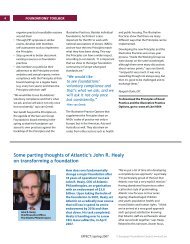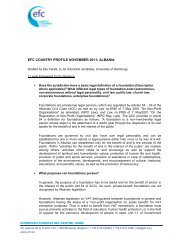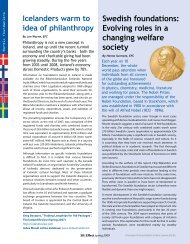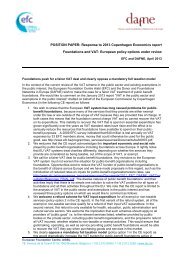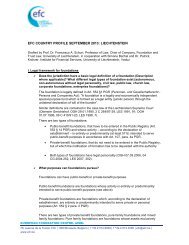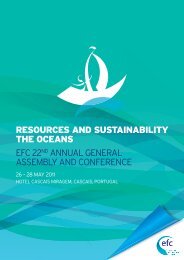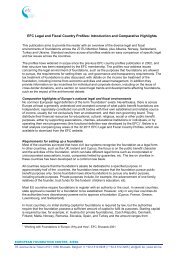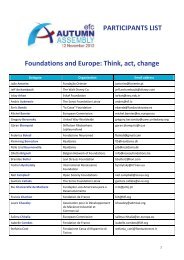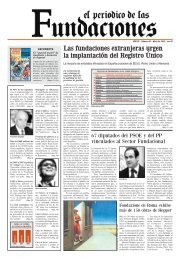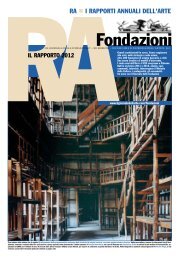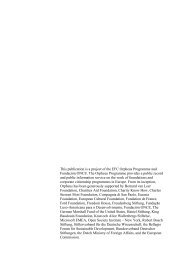European perspectives on global health: a policy glossary
European perspectives on global health: a policy glossary
European perspectives on global health: a policy glossary
Create successful ePaper yourself
Turn your PDF publications into a flip-book with our unique Google optimized e-Paper software.
2. Europe must include <strong>global</strong> <strong>health</strong> in all fields of <strong>policy</strong><br />
War and <strong>health</strong><br />
War is a man-made disaster causing loss of<br />
catastrophic proporti<strong>on</strong>s resulting in significant<br />
physical damage or destructi<strong>on</strong>, loss of life and<br />
permanent change to the natural envir<strong>on</strong>ment<br />
and calling for humanitarian c<strong>on</strong>cern over<br />
people’s welfare, the alleviati<strong>on</strong> of suffering<br />
and compassi<strong>on</strong>. Wars lead to destructi<strong>on</strong> of<br />
<strong>health</strong> infrastructure, cause flight of capital<br />
( both social and financial ) and the diminuti<strong>on</strong><br />
of resources.<br />
The method of waging war is to render the enemy<br />
incapable of fighting through their destructi<strong>on</strong>,<br />
injury, or undermining of support systems such as<br />
government, infrastructure, community, ideology,<br />
religi<strong>on</strong> or culture. Thus wars destroy individuals,<br />
families and communities including <strong>health</strong><br />
infrastructure as well as disease preventi<strong>on</strong> and<br />
<strong>health</strong> promoting efforts. Recent evidence points to<br />
the perniciously deleterious effects of war trauma<br />
<strong>on</strong> the mental and physical <strong>health</strong> of individuals,<br />
families and communities. Such mass trauma has<br />
c<strong>on</strong>tributed to retarded ec<strong>on</strong>omic development and<br />
to the emergence and maintenance of diseases and<br />
epidemics in the world with c<strong>on</strong>sequent public <strong>health</strong><br />
implicati<strong>on</strong>s. These effects may span generati<strong>on</strong>s with<br />
significant negative impacts <strong>on</strong> the public <strong>health</strong> and<br />
socio-ec<strong>on</strong>omic development of affected societies.<br />
Wars may be waged between states or between<br />
groups within states as in Bosnia and Rwanda or by<br />
groups spanning states such Al-Qaeda.<br />
The recent phenomen<strong>on</strong> of so-called “low-intensity”<br />
warfare causes more casualties am<strong>on</strong>g civilians than<br />
am<strong>on</strong>g combatants. Such wars have characterised<br />
modern warfare, resulting in milli<strong>on</strong>s of civilian<br />
casualties worldwide and creating massive populati<strong>on</strong><br />
displacements, refugees, epidemics and significant<br />
human suffering as well as trans-generati<strong>on</strong>al<br />
effects such as genocides, perpetual poverty and<br />
marginalisati<strong>on</strong>. Often civilians are targeted, as<br />
human shields, in genocides, the rape of women<br />
and the use of child soldiers. The phenomen<strong>on</strong> of<br />
gender-based sexual violence directed to women, as<br />
a weap<strong>on</strong> of war, has increased in recent wars as was<br />
seen in Bosnia and Rwanda. The l<strong>on</strong>g-term mental<br />
and physical <strong>health</strong> fallout of such traumatisati<strong>on</strong> and<br />
their public <strong>health</strong> implicati<strong>on</strong>s to <strong>global</strong> <strong>health</strong> has<br />
yet to be fully investigated.<br />
In modern warfare, weap<strong>on</strong>s have increasing lethality<br />
and armies do not distinguish between combatants<br />
and n<strong>on</strong>-combatants, resulting in mounting civilian<br />
casualties and destructi<strong>on</strong> of envir<strong>on</strong>ments. The<br />
weap<strong>on</strong>s used in these wars are almost always<br />
manufactured and imported from Europe ( France, UK,<br />
Germany ), the USA and the Russian Federati<strong>on</strong>. There<br />
is a massive trade in small arms of which there are<br />
more than 640 milli<strong>on</strong> worldwide.<br />
Asymmetric warfare refers to the ability of groups<br />
to wage war <strong>on</strong> more powerful adversaries by using<br />
n<strong>on</strong>-c<strong>on</strong>venti<strong>on</strong>al means, including suicide bombs, bioterrorism<br />
and guerrilla tactics. This has been a feature<br />
of what is now called the war against terrorism. Since<br />
there are many ways in which biological agents could<br />
be used as terrorist weap<strong>on</strong>s, this has been a major<br />
cause of the securitisati<strong>on</strong> of public <strong>health</strong>.<br />
The l<strong>on</strong>g-term mental and physical <strong>health</strong> fallout<br />
of war and its public <strong>health</strong> implicati<strong>on</strong>s for <strong>global</strong><br />
<strong>health</strong> has yet to be fully investigated. But studies<br />
show clearly that war has major direct and indirect,<br />
immediate and l<strong>on</strong>g-term implicati<strong>on</strong>s for <strong>global</strong><br />
<strong>health</strong>.<br />
Over 60 countries of the world today are affected by<br />
war, especially poor countries, resulting in massive<br />
human displacements and affecting more than 19.2<br />
milli<strong>on</strong> people worldwide as refugees, internally<br />
displaced pers<strong>on</strong>s or the war-traumatised. Hunger<br />
( famines ) and disease ( epidemics ) increase. Europe<br />
is the destinati<strong>on</strong> of many of the people who flee<br />
from the disasters of war in their countries. Often such<br />
refugees suffer a triple <strong>health</strong> burden : the trauma<br />
of war and displacement, the diseases to which they<br />
have been exposed. and lack of access to <strong>health</strong> and<br />
social support in the country to which they flee due to<br />
language and cultural barriers and lack of provisi<strong>on</strong>.<br />
The <str<strong>on</strong>g>European</str<strong>on</strong>g> Commissi<strong>on</strong>’s Humanitarian Aid<br />
Office ( ECHO ) includes in its mandate the provisi<strong>on</strong><br />
of emergency assistance and relief to victims of<br />
armed c<strong>on</strong>flicts, and the <str<strong>on</strong>g>European</str<strong>on</strong>g> Rapid Resp<strong>on</strong>se<br />
Force ( ERRF ) has growing capability to provide<br />
peacekeeping forces. Where war brings with it a major<br />
<strong>health</strong> risk the <str<strong>on</strong>g>European</str<strong>on</strong>g> Centre for Disease Preventi<strong>on</strong><br />
24 <str<strong>on</strong>g>European</str<strong>on</strong>g> Foundati<strong>on</strong> Centre – <str<strong>on</strong>g>European</str<strong>on</strong>g> Partnership for Global Health



